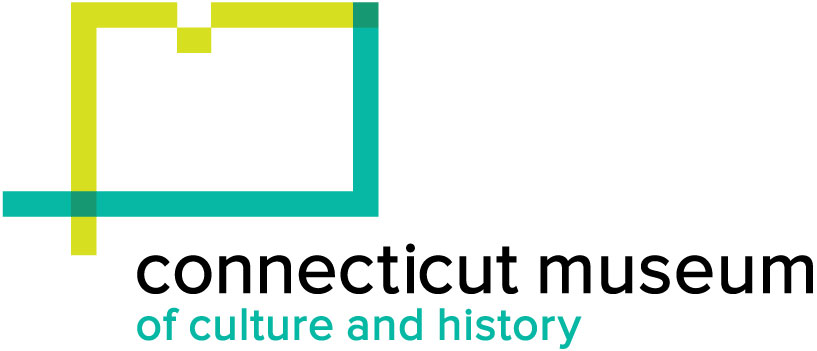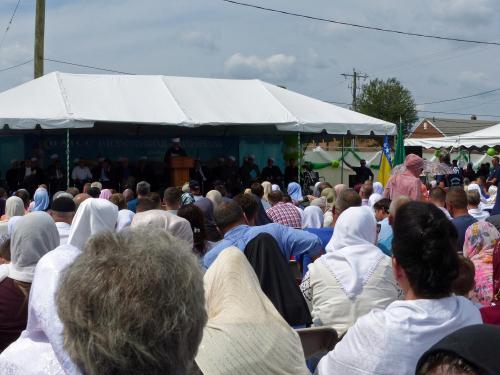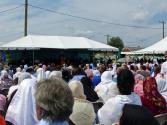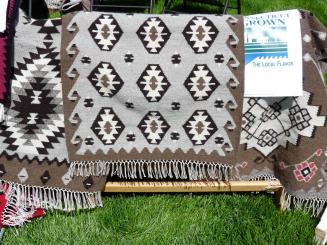Bosnian-American Islamic Cultural Center Opening, Hartford
SubjectPortrait of
Fatima Vejzovic
(Bosnian)
SubjectPortrait of
Ajsa Guster
(Bosnian)
Date2018 August 25
Mediumborn digital photography
ClassificationsGraphics
Credit LineConnecticut Cultural Heritage Arts Program collections
CopyrightIn Copyright
Object number2015.196.723.1-.10
DescriptionPhotographs of people attending the opening ceremony for the Bosnian-American Islamic Cultural Center on Franklin Avenue in Hartford on August 25, 2018. Exterior architectural features and interior decorative features are visible in the photographs.
(.1-.2) Images of the ceremony taking place on the covered dais with visiting imams.
(.3) Image of attendees outside by the mosque.
(.4) Image of Bosnian weaver Fatima Vejzovic with her daughter Farhiya, visiting from Bosnia.
(.5) Image of Bosnian weavers and their families. Pictured left to right are Farhiya (Fatima's daughter), Fatima Vejzovic, and Ajsa Guster and her husband.
(.6) Image of Bosnian women attending the event. Pictured left to right are Fatima Vejzovic, two unidentified people, and Farhiya (Fatima's daughter).
(.7-.10) Images of the interior of the mosque.
NotesSubject Note: Greater Hartford is now home to several thousand Bosnians, many coming here as refugees from the war in the former Yugoslavia in the mid-late 1990s and early 2000s. In 2018, the Bosnian community opened a new mosque, the Bosnian-American Islamic Cultural Center, at 595 Franklin Avenue in Hartford. The new building, which houses educational classrooms, cooking and washing facilities, gathering spaces as well as the mosque itself, renovated the existing mosque that the community opened in 2007. The opening event on August 25 was attended by over one thousand Bosnian Muslims from all across the United States, and the ceremony and dedication were led by many visiting and local imams, as a sign of the significance of the occasion. The event included tours of the center and a meal provided to all who attended. The Center hosts daily prayer services, classes, discussion groups, special events, and community gatherings. The Bosnian-American Youth Association of Hartford, which aims to help the Bosnian community preserve its culture and history while expanding intercultural relations, is based there as well.(.1-.2) Images of the ceremony taking place on the covered dais with visiting imams.
(.3) Image of attendees outside by the mosque.
(.4) Image of Bosnian weaver Fatima Vejzovic with her daughter Farhiya, visiting from Bosnia.
(.5) Image of Bosnian weavers and their families. Pictured left to right are Farhiya (Fatima's daughter), Fatima Vejzovic, and Ajsa Guster and her husband.
(.6) Image of Bosnian women attending the event. Pictured left to right are Fatima Vejzovic, two unidentified people, and Farhiya (Fatima's daughter).
(.7-.10) Images of the interior of the mosque.
Biographical Note: Fatima Vejzovic is a skilled weaver of traditional Bosnian wool flat-weave carpets made on a simple wooden loom constructed by family members in her home. She learned this traditional craft from mothers, aunts, neighbors, and friends in her village, using wool from sheep raised on their farm. After the war Fatima and many weavers worked for Bosfam, a successful crafts cooperative established in Tuzla to assist women with income-generating projects while providing therapeutic and social support. Their work has appeared in catalogues selling the carpets internationally. Fatima arrived in Hartford with her family in 2002. Greater Hartford is now home to over 10,000 Bosnians, most coming as refugees from the war in the former Yugoslavia. For the women in the community, many of them widows, continuing to practice their familiar arts of weaving, knitting, and crochet lace helps them to cope with the trauma of the genocide their families suffered. Fatima’s art works include large floor carpets as well as smaller weavings, and she fashions the woven tapestry fabric into bags, purses, and pillows. Fatima also makes hand-knitted clothes, crochet lace tablecloths, and Bosnian socks worn inside the home. She won a 2021 Connecticut Office of the Arts Fellowship in Folk and Traditional Arts.
Bosnian flat-weave carpets, called ćilimi after their Turkish antecedents (kilims), adorn all parts of the home – floors, walls, chairs and sofas, tables, and beds. The weavings also serve an important function as prayer rugs for these Muslim families. While sometimes made commercially with chemical dyes, the traditional rugs woven by village women still use wool processed by them and colored with natural dyes. Ćilimi designs maintain their Turkish roots but also show European influences stemming from Bosnia’s close connections with Vienna in the early 20th century. Fatima weaves traditional geometric patterns in seemingly endless variations, and she also enjoys adding floral motifs and creating new pictorial designs. Fatima does not use templates or printed patterns – her designs are created as she starts a weaving on the loom, depending on what colors of wool she has available. She developed a new idea for a weaving depicting a whimsical goat, that she made into bags and wall hangings that have become very popular. Fatima also weaves lettering and names into a ćilim, creating a narrative feature that led to a multi-year commission to produce commemorative banners in the organization’s colors for the Aurora Foundation’s retiring board members.
Through a partnership with Clatter Ridge Farm, whose sheep graze on the grounds of the Hill-Stead Museum in Farmington, Connecticut, Fatima has created a series of weavings using their high-quality Shetland wool. The undyed wool gives the rugs a beautiful softness and durability as well as subtle variations of natural color.
Fatima taught her daughter, Fikreta Muratovic, to weave and they worked together for the Bosfam enterprise in Bosnia. As part of the Southern New England Traditional Arts Apprenticeship Program in 2005, Fatima taught loom weaving to a younger Bosnian woman in Hartford, helping to pass on this beloved tradition in their new home. Fatima has given weaving workshops to Hartford students at four schools through Hartford Performs, and to students from Miss Porters School and the Greater Hartford Academy of the Arts. Fatima has worked with three interns from Trinity College through the Sewing Circle Project. As part of the Hartford Performs program for teaching artists in schools, Fatima has taught the basics of loom weaving to students in Hartford, Windsor Locks, and Miss Porter’s School.
Fatima was one of the founding members of the Sewing Circle Project, which began in early 2007 as a partnership to encourage cultural sustainability among the many immigrant and refugee communities in the Greater Hartford area and across Connecticut. Engaging with public audiences has given Fatima opportunities to improve her English-speaking skills, broaden her social networks, and showcase Bosnian cultural traditions. She has demonstrated and sold her work at the Hartford Public Library World Refugee Day; Hartford Open Studio Weekends; the University of Connecticut; the Hill-Stead Museum; the Vermont Folklife Center; the American Folklore Society; the New York Folklore Society; the West Hartford Art League; Ten Thousand Villages; several local house parties; and at the Billings Forge Farmers Market. She enjoys creating new designs for private commissions. Fatima’s work has been included in exhibitions at the Institute for Community Research, the Connecticut Historical Society, the Connecticut Office of the Arts Gallery, and the Clare Gallery.
Biographical Note: Ajsa Guster is a skilled weaver of Bosnian ćilimi, carpets, wall hangings, and seat covers. She also knits and crochets. She has been a participant in the Connecticut Cultural Heritage Arts Program's Sewing Circle Project since its beginning in 2007.
Additional photographic and video materials are present in the CCHAP archive relating to this event, this community, and the artists.
Cataloging Note: This project was made possible in part by the Institute of Museum and Library Services MA-245929-OMS-20.
Status
Not on viewHaris Gusta Guya
2011 November 4
Fatima Vejzovic
2011 November 16






















